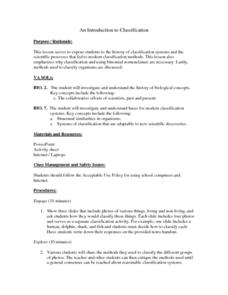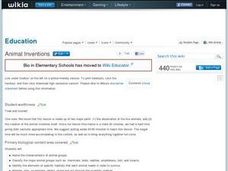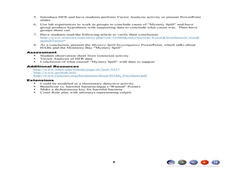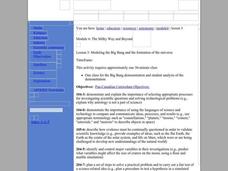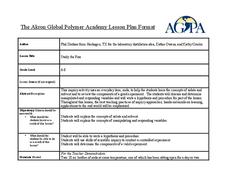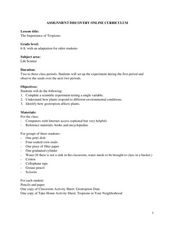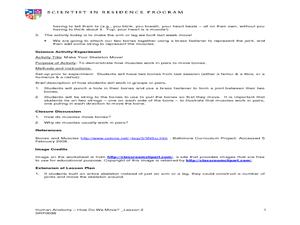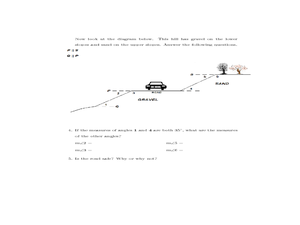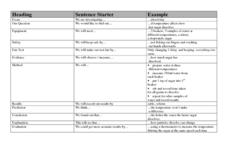Curated OER
An Introduction to Classification
Sixth graders explore, analyze and study the history of classification systems and the scientific processes that influenced modern classification methods. They evaluate why classification and binomial nomenclature are necessary to the...
Curated OER
Using Inspiration To Support Logical Reasoning
Students share descriptions of science experiments they have conducted. They create a thin film on the surface of water in order to float light objects and observe that a paper clip does, indeed, float on the surface of the water at...
Curated OER
What is Classification?
In this classification instructional activity, students describe the difference between Homo erectus and Homo sapiens. Then they define taxonomy and explain what was wrong with Aristotle's method of classification. Students also describe...
Curated OER
Animal Inventions
Students name the characteristics of animal groups. Students classify the major animal groups such as: mammals, birds, reptiles, amphibians, fish, and insects. They identify the elements of specific habitats that each animal needs in...
Curated OER
Designing the Experiment and Answering the Question
Students investigate scientific methods by analyzing an article from the Natural Inquirer. In this data analysis lesson, students read an article from the magazine and discuss at least 2 scientific methods that could be used to solve...
Curated OER
Mystery Spill
Students investigate the cause of birds dying in Monterey Bay. In this scientific research lesson, students use various resources, scientific investigations, and vector analysis to solve an environmental mystery.
Curated OER
The Big Bang Theory
Students will use scientific reasoning to formulate ideas about the formation of the universe using the Big Bang Theory. The use of critical thinking skills is part of the activity and the foundation of the scientific method will serve...
Curated OER
Milk and Monarch Butterfly Mania Journal Entry
In this milk and monarch butterfly mania journal entry worksheet, students write a scientific journal entry about the milkweed plant, using the information from another linked website. This worksheet includes many links to other web...
Curated OER
Plants 'n' Bugs
Second graders experiment to find if pollinators have color preferences. For this plant and bug lesson, 2nd graders gather information about how flowers pollinate. Students participate in a pollination experiment using the scientific...
Curated OER
So You Want To Be A Mythbuster?
Students recognize the parts used to construct a car. In this mythbuster lesson, students will use the scientific method to complete an experiment with student constructed cars to bust a myth. Students will reflect on what they have...
Curated OER
Study the Fizz
Middle schoolers experiment to determine which bottle of soda has more dissolved carbon dioxide. In this solutions lesson, students use the scientific method to test the amount of carbon dioxide in bottles of soda. They identify and...
Curated OER
The Importance of Tropisms
Students investigate plant tropisms using the scientific method. In this life science lesson, students learn about tropisms and test the response of corn seedlings to gravity. Response questions, extensions, and an adaptation for older...
Curated OER
Human Anatomy - How Do We Move?
Fifth graders discover how blood moves around the body. In this circulatory system lesson, 5th graders feel their pulse before and after exercise. Students count their heart rate. Students use the scientific method to record their...
Curated OER
The Tipping Point
Students rewrite word problems and solve using math. In this word problem instructional activity, students gather data and observe the data. They relate this process to the scientific method and math. They review their data to be able to...
Curated OER
Fact vs. Opinion: Theory, Hypothesis, and Bias
Emphasize the differences between a theory and a hypothesis to teach your class how to avoid scientific bias.
Curated OER
Peanut Butter and Jelly: The Importance of Detailed Procedures
Students write a list of steps to be taken in making a peanut butter and jelly sandwich. They observe as the instructor literally follows each step. After realizing the importance of clear communication, students write a scientific...
Curated OER
Summer Science Recipes: Experiments on the Grill and in the Kitchen
Generate ideas about the most scientifically sound ways to prepare foods safely and efficiently during the summer season. Learners will use the GED Connection Science Workbook, so they can practice the skills needed to prepare for the...
Chicago Botanic Garden
Historical Climate Cycles
What better way to make predictions about future weather and climate patterns than with actual climate data from the past? Young climatologists analyze data from 400,000 to 10,000 years ago to determine if climate has changed over time....
Compassion in World Farming Trust
Selective Breeding of Farm Animals
Biology learners read about selective breeding in chickens and how it has produced high-yield meat specimens and rapid egg-layers. The unpleasant effects of artificial selection are explored, as well as options to supporting this...
Teaching Ideas
Investigation Prompts
Get your class started with experimentation and investigation by providing sentence starters. This chart is made up of three columns. The first column lists steps of the scientific process and the second provides sentence starters for...
Curated OER
Robert Boyle and Experimental Methods
Students discuss the difference between the Baconian inductive method and the Aristotelian deductive approaches. They complete a given set of questions then discuss them with the class.
Curated OER
Centrifugal Force and Mandy Sue Day
Fourth graders explore the story Mandy Sue Day and investigate centrifugal force. They demonstrate the concept of centrifugal force, use analytical thinking and they conduct an experiment using centrifugal force. Students discuss the...
Curated OER
Social Studies: Cooking Methods - Past and Present
Fourth graders identify geographic regions (Texas' Edwards Plateau) and sequence steps in the hot rock cooking process. They compare and contrast prehistoric and contemporary cooking methods. Students conduct online research and record...
Curated OER
Emulsion_ Compulsion
Middle schoolers experiment with common household products to determine the properties of emulsions and how they fit into the classifications of matter through this series of lessons.


